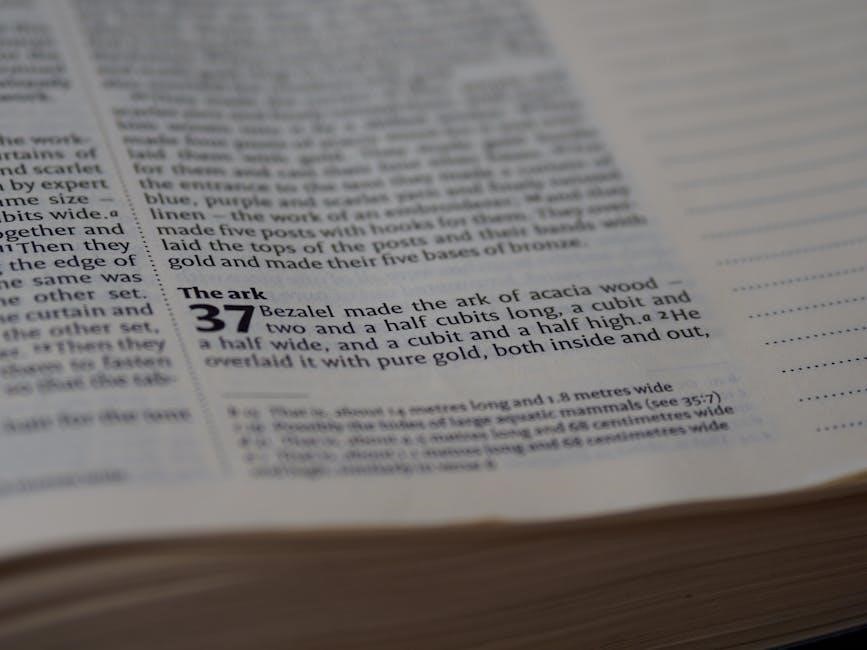Exploring Exodus reveals God’s redemption plan‚ highlighting deliverance from slavery and the establishment of covenant principles․ Study guides with questions and answers deepen understanding‚ fostering spiritual growth and faith reflection․
Overview of the Book of Exodus
The Book of Exodus narrates the Israelites’ deliverance from Egyptian slavery‚ led by Moses‚ and their journey to the Promised Land․ It begins with their oppression in Egypt‚ highlighting God’s intervention through miraculous plagues and the parting of the Red Sea․ Moses‚ as a prophet and leader‚ receives the Ten Commandments on Mount Sinai‚ establishing a covenant between God and His people; The book also details the construction of the tabernacle‚ symbolizing God’s presence among the Israelites․ Exodus emphasizes themes of redemption‚ faith‚ and obedience‚ providing foundational teachings for spiritual growth․ Study guides and questions and answers pdfs help deepen understanding of these events and their relevance for modern believers‚ fostering a stronger connection to God’s plan of salvation and freedom․
Importance of Studying Exodus for Spiritual Growth
Importance of Studying Exodus for Spiritual Growth
Studying Exodus is crucial for spiritual growth as it reveals God’s plan of redemption and deliverance․ The book illustrates trust in divine providence‚ exemplified through Moses’ leadership and the Israelites’ journey from slavery to freedom․ It emphasizes obedience to God’s commands and the importance of community‚ reflected in the construction of the tabernacle․ Exodus also highlights the transformative power of faith‚ as seen in the parting of the Red Sea and the reception of the Ten Commandments․ These lessons provide a foundation for understanding God’s covenant relationship with His people and inspire believers to apply biblical truths to modern life․ Through Bible study questions and answers‚ individuals can deepen their understanding‚ fostering a stronger spiritual connection and a deeper appreciation for God’s grace and guidance․

Key Themes in Exodus
Key themes in Exodus include deliverance‚ redemption‚ and the establishment of divine law through the Ten Commandments‚ reflecting God’s covenant and presence among His people․
The Theme of Deliverance and Redemption
The theme of deliverance and redemption in Exodus is central‚ showcasing God’s divine intervention to free the Israelites from Egyptian bondage․ This narrative highlights God’s faithfulness and power‚ as seen through the ten plagues and the parting of the Red Sea․ The Israelites’ suffering in Egypt mirrors the human condition of spiritual bondage‚ making their deliverance a powerful metaphor for redemption․ Bible study questions often explore how this theme applies to modern believers‚ emphasizing trust in God’s plan and the ultimate liberation found in Christ․ The Exodus story serves as a testament to God’s promise of deliverance‚ offering hope and encouragement for spiritual freedom today․
The Role of Moses as a Leader and Prophet
Moses’ role as a leader and prophet is pivotal in Exodus‚ showcasing his divine calling and humility․ Despite initial hesitations‚ Moses obediently accepted God’s mission to lead the Israelites out of Egyptian bondage․ His leadership was marked by faith‚ courage‚ and reliance on God’s guidance․ As a prophet‚ Moses acted as an intermediary‚ communicating God’s commands and promises to His people․ His encounters with God‚ such as the burning bush and receiving the Ten Commandments‚ highlight his unique relationship with the Divine․ Bible study questions often explore Moses’ transformation from a reluctant leader to a confident deliverer‚ emphasizing the importance of trust and obedience․ His journey serves as a timeless model for leaders and believers‚ illustrating how God equips the humble for extraordinary tasks and uses them to fulfill His redemptive plan․

Major Events in Exodus
Key events include the Ten Plagues‚ the parting of the Red Sea‚ and the Israelites’ dramatic escape from Egypt‚ showcasing God’s power and deliverance․
The Ten Plagues and Their Significance
The Ten Plagues were a series of divine judgments sent by God upon Egypt to compel Pharaoh to release the Israelites from bondage․ Each plague‚ from the turning of water into blood to the death of the firstborn‚ demonstrated God’s power and His desire to free His people․ These events served as both a punishment for Pharaoh’s obstinacy and a revelation of God’s sovereignty․ The plagues also underscored the distinction between the Israelites and the Egyptians‚ as the Israelites were spared the worst of the afflictions․ Study questions often focus on the symbolism of each plague and their theological significance‚ encouraging deeper reflection on God’s justice and mercy․ The plagues remain a pivotal moment in biblical history‚ illustrating God’s intervention in human affairs for the sake of His people․
The Parting of the Red Sea: A Miracle of Faith
The parting of the Red Sea is one of the most iconic miracles in the Bible‚ showcasing God’s power and faithfulness․ As the Israelites fled from Pharaoh’s army‚ they found themselves trapped between the sea and their pursuers․ In their desperation‚ God instructed Moses to raise his staff‚ and the sea miraculously divided‚ creating a path to safety․ This event symbolizes deliverance and salvation‚ reinforcing the theme of God’s redemption․ It also highlights the importance of faith and trust in divine providence‚ even in the face of overwhelming odds․ Bible study questions often explore the emotional and spiritual responses of the Israelites‚ the role of Moses’ leadership‚ and the broader theological implications of this miracle․ The parting of the Red Sea remains a powerful testament to God’s intervention in history․

Bible Study Questions on Exodus
Engage with key events and themes through thought-provoking questions about Moses’ leadership‚ the Ten Commandments‚ and the Israelites’ journey‚ connecting biblical truths to modern faith․
Questions About Moses’ Early Life and Calling
Understanding Moses’ early life and divine calling provides insight into his role as a leader․ Questions like‚ “To what tribe did Moses’ parents belong?” highlight his Levite heritage․ Another key question asks‚ “How long did Moses’ mother hide him before placing him in an ark?” This reveals her faith and obedience․ Additionally‚ inquiries about Moses’ upbringing in Pharaoh’s palace and his eventual exile to Midian explore his unique journey․ These questions help uncover God’s providence in preparing Moses for his mission․ Reflecting on Exodus 3:11‚ one might ask‚ “What was Moses’ initial response to God’s call‚ and how did God reassure him?” Such questions deepen understanding of Moses’ humility and reliance on God․ These reflections foster a deeper connection to the biblical narrative and its spiritual significance today․
Questions About the Ten Commandments and Their Relevance Today
Exploring the Ten Commandments in Exodus 20 reveals foundational moral and ethical guidelines․ Questions like‚ “What is the significance of the Ten Commandments in Exodus?” and “How do they apply to modern life?” encourage deeper reflection․ These commandments‚ such as honoring parents and not coveting‚ remain timeless principles․ They serve as a bridge between ancient Israel’s covenant with God and contemporary Christian living․ Study questions prompt readers to consider how these laws foster love for God and neighbor․ For instance‚ “How does ‘You shall not steal’ relate to honesty in today’s digital age?” Such inquiries highlight the commandments’ enduring relevance․ They remind believers of God’s desire for holiness and the universal need for moral integrity‚ making them essential for spiritual growth and daily living․

Connections Between Exodus and the New Testament
Exodus foreshadows Christ’s redemption‚ with Moses symbolizing Jesus as a deliverer‚ emphasizing faith and liberation from spiritual bondage‚ reflecting divine salvation in the New Testament․
Parallels Between the Exodus and the Life of Jesus Christ
The Exodus story mirrors the life of Jesus Christ‚ as both narratives depict deliverance from oppression․ Moses‚ like Jesus‚ acts as a divine deliverer‚ leading His people to freedom․ The parting of the Red Sea symbolizes baptism‚ much like Jesus’ ministry‚ where believers are cleansed from sin․ Both figures perform miracles‚ with Moses’ wonders in Egypt foreshadowing Jesus’ healing and provision․ The Passover‚ a central Exodus event‚ finds fulfillment in Jesus as the Lamb of God‚ whose sacrifice redeems humanity․ Additionally‚ Jesus’ teachings emphasize spiritual freedom‚ echoing the Israelites’ physical liberation․ These parallels highlight God’s consistent plan of redemption‚ with Jesus completing the work begun in Exodus․
Exodus as a Foreshadowing of Spiritual Freedom in Christ
The Exodus narrative serves as a profound foreshadowing of the spiritual freedom offered through Jesus Christ․ The Israelites’ deliverance from Egyptian slavery symbolizes humanity’s liberation from sin․ Moses‚ as a mediator‚ prefigures Christ’s role as the ultimate mediator between God and humanity․ The parting of the Red Sea represents baptism‚ where believers are cleansed from sin and enter into a new covenant with God․ The Passover‚ where the lamb’s blood saves the firstborn‚ directly points to Christ’s sacrifice‚ which redeems all people from spiritual bondage․ Additionally‚ the wilderness journey mirrors the Christian walk‚ emphasizing trust in God’s provision and guidance․ These parallels illustrate how Exodus lays the foundation for understanding Christ’s mission to free humanity from sin’s slavery‚ offering eternal life and a covenant of grace․
